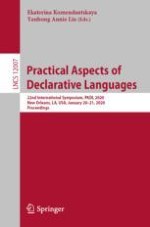2020 | OriginalPaper | Buchkapitel
Explanations for Dynamic Programming
verfasst von : Martin Erwig, Prashant Kumar, Alan Fern
Erschienen in: Practical Aspects of Declarative Languages
Aktivieren Sie unsere intelligente Suche, um passende Fachinhalte oder Patente zu finden.
Wählen Sie Textabschnitte aus um mit Künstlicher Intelligenz passenden Patente zu finden. powered by
Markieren Sie Textabschnitte, um KI-gestützt weitere passende Inhalte zu finden. powered by

 for
for
 is required to keep the types in the multi-parameter type class unambiguous. Moreover, we can’t unfortunately simply give the generic definition for
is required to keep the types in the multi-parameter type class unambiguous. Moreover, we can’t unfortunately simply give the generic definition for
 indicated by the equation, since that would also lead to an ambiguous type.
indicated by the equation, since that would also lead to an ambiguous type.